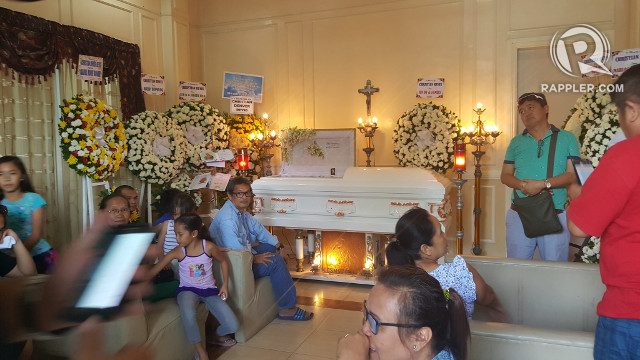SUMMARY
This is AI generated summarization, which may have errors. For context, always refer to the full article.

DAVAO CITY, Philippines – A sunny morning dawned on Davao City on Sunday, September 4, 2016.
It would have been inconceivable to think that just two nights before, an explosion turned one of its most vibrant streets into a scene of death and chaos.
But that bloody night still made itself felt. Noticeably fewer cars whizzed through Davao City’s streets. Less people could be found in its malls.
On JP Laurel Avenue, one of the city’s main thoroughfares, the traffic level at 10:30 am was more similar to traffic at 5 am, said resident Dennis Dejos.
“Ganito lang ‘yung mga kalsada ‘pag may away si Pacquiao (It’s only like this when Pacquiao has a fight),” he said.
Some smaller streets were completely empty save for some parked cars.
JP Laurel Ave, one of Davao City’s main streets, has 5am traffic level at 10:30am. Many people staying at home today pic.twitter.com/kVExRUEXqJ
— Pia Ranada (@piaranada) September 4, 2016
That morning, he had gone to Gaisano Mall to buy a polo shirt for his son.
“Usually, pag ganitong oras, 10 [am], ang daming tao (Usually, at this time, there are a lot of people),” he told Rappler.
Taxis, lacking passengers, could be found waiting in groups in gas stations.
Unusually large number of taxis in garage. Mechanic says drivers went home bec of lack of passengers in Davao City pic.twitter.com/yt8omQHlFk
— Pia Ranada (@piaranada) September 4, 2016
“Umuwi na ang mga driver kasi walang kita, walang pasahero (The drivers went home because they aren’t making any profit. There are no passengers.),” said Jungjung Dorña, mechanic of the SMTI Taxi company.
On Sundays, there are usually only 7 taxis parked in the garage. Today there are 19.
Sundays in the city are typically lively and busy because people from nearby provinces come to visit.
Now, the only areas with traffic jams are where military and police checkpoints are stationed.
Fifty-year-old Caridad Parkot only ventured out of her home today to attend Mass.
Asked what she is doing after, she said, “Natatakot kami sa banta. Sa bahay lang kasi natatakot nga kami.” (We are scared of the threats. So we will just stay home, because we are scared.)
‘Is it still safe?’
While streets and public places lacked the usual crowds, funeral homes teemed with activity.
At the Cosmopolitan Memorial Chapel, all of its rooms were occupied by wakes, many of which were for victims of the Roxas Night Market blast.
The wake for Evelyn Sobrecarey, one of the masseuses who died on the spot at Roxas Avenue, was held here.
SPO1 Jay Adremesin was with his wife and son for his usual Saturday night massage when the #DavaoBlast happened pic.twitter.com/Ry5wU4lFfj
— Pia Ranada (@piaranada) September 4, 2016
Police Inspector Omelito Sobrecarey, her husband, was on checkpoint duty when the blast happened.
Evelyn took a massage certification course offered by the government and was supposed to graduate the day after the blast.
She had started working as a masseuse at the market to help augment her husband’s police salary.
“Gusto niya kumita kasi kaunti lang ‘yung sahod ko. Nasa malapit ‘yung bomba, na on the spot siya,” said Omelito. (She wanted to earn because I have a small salary. She was near the bomb so she died on the spot.)
In the next room, the wake of another blast victim, Christian Denver Reyes, was being held.
Reyes was a 36-year-old who had a business selling wares at a wet market. He was having a massage at the night market. Flowers from President Rodrigo Duterte and Davao City Mayor Sara Duterte were displayed at the entrance of his wake.
‘Wake-up call’
Christian’s father Donato is as bereaved as any parent would be, but he is still confident government officials are doing their best to ensure the safety of citizens.
“Hindi pa rin magpapabaya ang mga opisyal dito. Wala nang mangyayari (The officials here are not negligent. Nothing like this will happen again),” he said.
Ellen Adremesin, the 29-year-old wife of a policeman who died at the blast while having a massage, is not as trusting.
“Ayaw na ng kumpiyansa sa mga lugar kasi ilang beses kami nagpapamassage, ngayon lang nangyari. Hindi ko alam kung safe pa… At peace pa ba?” she wondered.
(I don’t want to feel over-confident about the safety in some places. We went for a massage there so many times, but this happened only now. I don’t know if it’s still safe…Is the city still at peace?)
Ellen shivered at the thought that she and her 9-year-old son had missed death only because she did not feel like getting a massage.
“Umalis ako kasi wala akong mood magpa-massage. Kaya ‘yung anak ko pinakain ko na lang,” she said. (I left because I was not in the mood for a massage. So I just bought food for my son.)
Councilor Diosdado Mahipus, who ventured out on Sunday to attend worship service, thinks the blast has jolted Davaoeños into renewed vigilance.
The explosion harked back to olden days when Davao City had experienced bomb attacks and street violence from fighting groups. (READ: A history of bombings in Davao City)
“I was looking at the situation as a wake-up call to the Davaoeños as well as all Filipinos that indeed we should not be too trusting and we should exert effort to maintain the peace and the security measures that we once imposed in Davao. When Davao became peaceful everybody started to put their guard down,” he said.
The scars of a tragedy will make going back to normal difficult.
But like any great city faced with a crisis, the challenge is to move on and stand taller than before. – Rappler.com
Add a comment
How does this make you feel?
There are no comments yet. Add your comment to start the conversation.